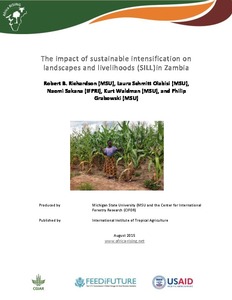Focal point
Location
About IFPRI
The International Food Policy Research Institute (IFPRI) provides research-based policy solutions to sustainably reduce poverty and end hunger and malnutrition in developing countries. Established in 1975, IFPRI currently has more than 500 employees working in over 50 countries. It is a research center of theCGIAR Consortium, a worldwide partnership engaged in agricultural research for development.
Vision and Mission
IFPRI’s vision is a world free of hunger and malnutrition. Its mission is to provide research-based policy solutions that sustainably reduce poverty and end hunger and malnutrition.
What We Do
Research at IFPRI focuses on six strategic areas:
- Ensuring Sustainable Food Production: IFPRI’s research analyzes options for policies, institutions, innovations, and technologies that can advance sustainable food production in a context of resource scarcity, threats to biodiversity, and climate change. READ MORE
- Promoting Healthy Food Systems: IFPRI examines how to improve diet quality and nutrition for the poor, focusing particularly on women and children, and works to create synergies among the three vital components of the food system: agriculture, health, and nutrition. READ MORE
- Improving Markets and Trade: IFPRI’s research focuses on strengthening markets and correcting market failures to enhance the benefits from market participation for small-scale farmers. READ MORE
- Transforming Agriculture: The aim of IFPRI’s research in this area is to improve development strategies to ensure broad-based rural growth and to accelerate the transformation from low-income, rural, agriculture-based economies to high-income, more urbanized, and industrial service-based ones. READ MORE
- Building Resilience: IFPRI’s research explores the causes and impacts of environmental, political, and economic shocks that can affect food security, nutrition, health, and well-being and evaluates interventions designed to enhance resilience at various levels. READ MORE
- Strengthening Institutions and Governance: IFPRI’s research on institutions centers on collective action in management of natural resources and farmer organizations. Its governance-focused research examines the political economy of agricultural policymaking, the degree of state capacity and political will required for achieving economic transformation, and the impacts of different governance arrangements.
Research on gender cuts across all six areas, because understanding the relationships between women and men can illuminate the pathway to sustainable and inclusive economic development.
IFPRI also leads two CGIAR Research Programs (CRPs): Policies, Institutions, and Markets (PIM) andAgriculture for Nutrition and Health (A4NH).
Beyond research, IFPRI’s work includes partnerships, communications, and capacity strengthening. The Institute collaborates with development implementers, public institutions, the private sector, farmers’ organizations, and other partners around the world.
Resources
Displaying 191 - 195 of 1521The power of WASH: Why sanitation matters for nutrition
Water, sanitation, and hygiene can have a profound effect on health and nutrition. A growing base of evidence on the link between sanitation, child height, and well-being has come at an opportune time, when the issue of sanitation and nutrition in developing countries has moved to the top of the post-2015 development agenda.
The impact of sustainable intensification on landscapes and livelihoods (SILL) in Zambia
Sinopse: (in)segurança de posse e investimento agrícola dos pequenos agricultores em Moçambique
Apesar de ser amplamente reconhecido que a segurança da posse de terras é uma parte integrante da intensificação agrícola, não existe um regime de direitos de propriedades único, claramente definido e universalmente aplicável com essa finalidade. Os países que procuram o desenvolvimento económico e a segurança alimentar através da intensificação agrícola têm de utilizar estratégias de governo de terras que se enquadrem nos seus respetivos contextos.
Market Access, Welfare, and Nutrition: Evidence from Ethiopia
We estimate the impact of improved market access on household well-being and nutrition using a quasi-experimental setting in Ethiopia. We find that households in remote areas consume substantially less than households nearer to markets, they are more food insecure, and their school enrollment rates are lower. Although their diets are also less diverse, we find no significant differences in anthropometric measures. Part of these welfare differences can be attributed to lower household agricultural production in remote areas.
The effects of political competition on rural land: Evidence from Pakistan
Can more vigorous political competition significantly raise rural land values, or contribute to more robust land rental markets? Exploiting exogenous variation in the national popularity of Pakistan’s political parties during the 2008 elections, we show that provincial assembly constituencies with greater competition between political parties had significantly higher land values and more active land rental markets four years later.






